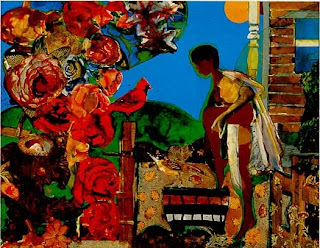More from Three Lives, by Gertrude Stein
One of the best lyrical passages in the book:
The languor and the stir, the warmth and weight and the strong feel of life from the deep centers of the earth that comes always with the early, soaking spring, when it is not answered with an active fervent joy, gives always anger, irritation and unrest.One of the persistent themes of Three Lives is the shifting power dynamics of an intimate relationship between two people. The following highly acute passage traces one such shift:
Of course Anna gave the money for this thing though she could not believe that it was best. No, it was very bad. Mrs. Lehntman could never make it pay and it would cost so much to keep. But what could our poor Anna do? Remember Mrs. Lehntman was the only romance Anna ever knew.[Image is Romare Bearden, Morning of Red Bird, 1975]
Anna’s strength in her control of what was done in Mrs. Lehntman’s house, was not now what it had been before that Lily’s little Johnny came. That thing had been for Anna a defeat. There had been no fighting to a finish but Mrs. Lehntman had very surely won.
Mrs. Lehntman needed Anna just as much as Anna needed Mrs. Lehntman, but Mrs. Lehntman was more ready to risk Anna’s loss, and so the good Anna grew always weaker in her power to control.
In friendship, power always has its downward curve. One’s strength to manage rises always higher until there comes a time one does not win, and though one may not really lose, still from the time that victory is not sure, one’s power slowly ceases to be strong. It is only in a close tie such as marriage, that influence can mount and grow always stronger with the years and never meet with a decline. It can only happen so when there is no way to escape.
Friendship goes by favor. There is always danger of a break or of a stronger power coming in between. Influence can only be a steady march when one can surely never break away.

Comments